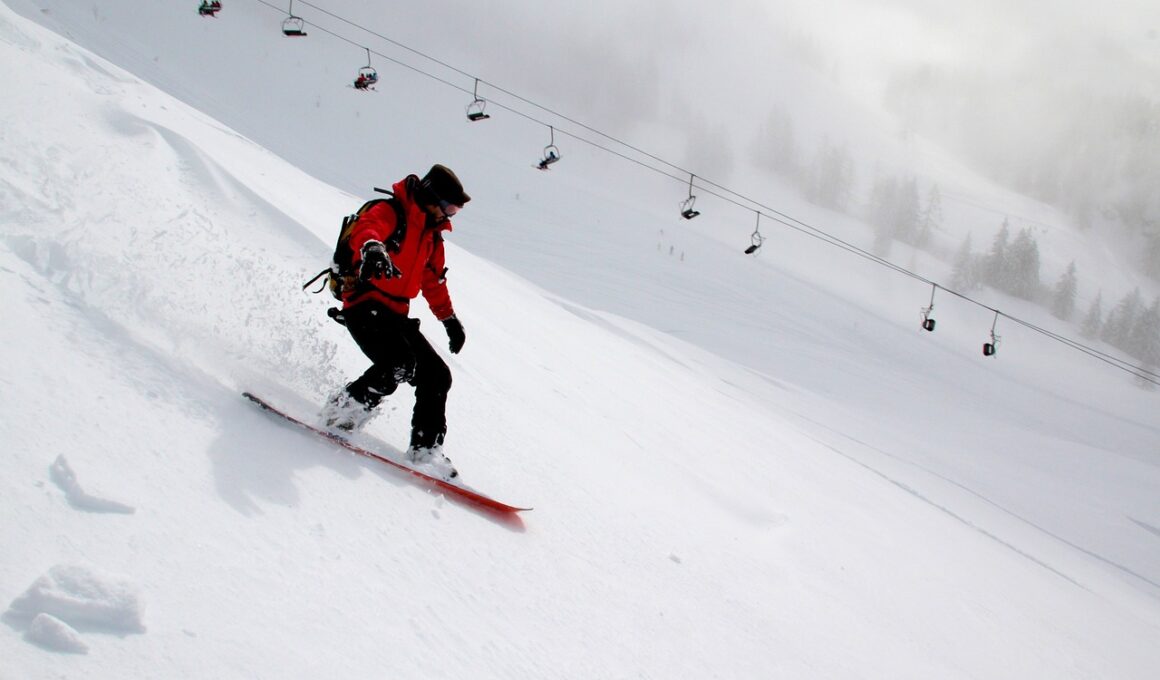Nutrition Tips for Snowboarders Competing at High Levels
Snowboarders engaging in high-level competitions require a strategic approach to nutrition. Proper nutrition not only boosts performance during competitions but also aids in recovery post-event. A well-balanced diet including carbohydrates, proteins, and healthy fats is essential. Carbohydrates serve as the primary energy source, providing fuel for intense physical activity, while proteins are vital for muscle repair and recovery. Incorporating a variety of fruits and vegetables ensures that snowboarders obtain necessary vitamins and minerals. Hydration also plays a critical role; athletes must consume sufficient fluids before, during, and after competition to maintain peak performance and optimal bodily functions. Ignoring hydration can lead to fatigue, decreased performance, and even health issues. It’s beneficial to plan meals around training sessions, focusing on nutrient-dense, high-energy foods to enhance endurance and overall performance. Measuring food portions and timing meals appropriately can help maintain energy levels throughout long competitions. In addition, professional advice from nutritionists might refine personal dietary choices, allowing athletes to discover what best fuels their bodies consistently. Implementing these nutritional strategies can significantly enhance a snowboarder’s competitive edge and longevity in the sport.
Carbohydrates: The Fuel
Carbohydrates are often termed the main fuel for athletes, especially those engaged in high-intensity sports like snowboarding. These individuals require energy-dense foods that quickly convert into fuel during competitions. High-glycemic foods such as bananas, white rice, and sports gels can provide rapid energy release, especially when consumed shortly before competitions. Alternatively, slow-digesting carbohydrates like whole grains and legumes provide sustained energy. Proper pre-competition meals should focus on light, easily digestible carbohydrates to avoid discomfort during intense sessions. Post-competition, refueling with carbohydrates is essential for glycogen replenishment, particularly after exhausting runs. Snowboarders should also consider carbohydrate loading in the days leading up to competitions to maximize their glycogen stores. This involves increasing carbohydrate intake while tapering physical activity. Snacks containing complex carbs, such as oats or sweet potatoes, are excellent options to maintain energy levels during events. Additionally, some athletes find success with carbohydrate-electrolyte drinks to sustain hydration and energy. By understanding their unique carbohydrate needs, snowboarders can optimize their food choices to enhance performance and reduce fatigue. Integrating these carbohydrate strategies plays a crucial role in overall success.
The role of protein in a snowboarder’s diet cannot be overstated, particularly when it comes to muscle recovery and growth. High-quality protein sources such as lean meats, fish, eggs, dairy, and plant-based proteins like lentils and beans are essential. Consuming adequate amounts of protein throughout the day enhances muscle repair, especially after intense training or competitions. Athletes need to focus on protein timing, which means consuming protein-rich meals or snacks soon after exercise. This timing can enhance muscle recovery and minimize soreness. Expert recommendations suggest a daily intake of approximately 1.6 to 2.2 grams of protein per kilogram of body weight, with an emphasis on high-quality sources. Some snowboarders integrate protein shakes into their routine for convenience. Planning meals rich in protein creates better recovery opportunities compared to inadequate protein intake. Furthermore, pairing protein with carbohydrates post-exercise optimizes recovery. This combination will help replenish glycogen stores and promote muscle repair effectively. Overall, when athletes emphasize protein both in amount and timing, they reap significant benefits. This dietary strategy becomes fundamental for snowboarders aiming to perform at their peak in competitions.
Healthy Fats for Energy
In addition to carbohydrates and proteins, healthy fats are crucial for the overall nutritional framework of snowboarders. While the perception of fat may often lean towards it being detrimental, healthy fats provide vital long-lasting energy, especially during prolonged sessions on the snow. Foods that are rich in omega-3 and omega-6 fatty acids, like avocados, nuts, seeds, and fatty fish, can aid in reducing inflammation and support overall joint health, which is essential given the demanding movements in snowboarding. Incorporating these fats into a well-balanced diet promotes energy sustainability and assists in vitamin absorption. One key strategy for snowboarders is to consume fats efficiently, particularly before competitions. A meal that combines carbohydrates with a source of healthy fat can offer extended energy, allowing athletes to maintain peak performance for longer durations. While focusing on healthy fats, snowboarders should limit saturated and trans fats, which can negatively impact cardiovascular health. Finding the right balance of nutrient-dense fats in the diet enables snowboarders to fuel their bodies effectively and optimize their performance when competing on challenging slopes.
Hydration is often overlooked, yet it is vital for snowboarding athletes. Maintaining optimal hydration directly impacts performance, endurance, and recovery. Dehydration can lead to severe performance declines, including fatigue, cramping, and impaired cognitive function. Snowboarders should aim to drink fluids regularly throughout the day, rather than waiting until they feel thirsty. A good rule of thumb is to drink about 500 ml of water two hours before competitions. Electrolyte-rich drinks can also aid in maintaining hydration levels, especially when snowboarding at high altitudes, where the air can be drier. During long competitions, sports drinks containing carbohydrates and electrolytes balance fluids and energy needs. Consuming water-rich foods like fruits improves overall hydration. Monitoring hydration status through urine color can also be a helpful indicator; pale-yellow suggests adequate hydration. Post-competition, replenishing lost fluids is critical; athletes should aim to replace at least 150% of fluid losses incurred during the event. Understanding individual hydration needs allows snowboarders to optimize performance, boost endurance, and enhance their competitive experience, giving them the best chance for success.
Meal Planning and Timing
Effective meal planning is essential for snowboarders who are serious about their training and competition results. Properly timed meals can significantly enhance performance and recovery. Athletes should prioritize meal timing to ensure they eat enough nutrient-dense foods before and after competitions. A standard guideline suggests eating a balanced meal with carbohydrates, proteins, and fats about three to four hours prior to competing. This ensures sufficient energy levels while avoiding any gastrointestinal distress. Post-competition, athletes should engage in fueling strategies immediately by consuming snacks or meals rich in nutrients within 30 minutes. This approach helps in muscle recovery and aids in replenishing energy levels quickly. Additionally, having quick snacks, like protein bars or whole fruit, on hand allows athletes to refuel as needed, especially when they’re busy. Planning meals over the week can also reduce the chances of skipping essential nutrition due to time constraints. Creating a meal prep routine, including cooking in batches, can enhance consistency and adherence to nutritional goals. Successful meal planning contributes significantly toward maintaining energy levels and ensuring snowboarders compete at their highest level.
Finally, beyond just food and hydration, mindfulness and psychological readiness are vital components of nutrition for snowboarders competing at high levels. The mental aspect of food choices can significantly influence overall performance. Many athletes encounter pressure and anxiety during competitions, leading them to either overeat or under-eat. Maintaining meal schedules and routines can help stabilize this psychological impact. Using techniques like mindful eating encourages athletes to focus on their meals, promoting better digestion and satisfaction. Moreover, working with sports psychologists may help athletes develop mental strategies geared towards eating behaviors relevant to performance. Snowboarders should learn to listen to their bodies and understand the specific nutritional demands posed by their unique training and competition schedules. Keeping stress levels low through relaxation techniques can also improve digestion and nutrient absorption. By integrating both mental strategies and nutrition planning, athletes can create sustainable dietary habits that support high-level performance. Overall success in snowboarding competitions hinges not only on rigorous physical training but also on comprehensive nutritional and psychological strategies, paving the way for an exceptional athletic journey.
To summarize, snowboarders competing at high levels must adopt a holistic approach to nutrition that encompasses not only macronutrients but also hydration, timing, and mental wellbeing. Understanding individual needs and preferences allows each athlete to implement effective strategies tailored to their lifestyle. Structured meal planning, the importance of proper hydration, and timing meals effectively are key elements in promoting performance and recovery. Increased focus on macronutrients, including carbohydrates, proteins, and healthy fats, proves vital for achieving athletic goals. Continuous education on nutrition, along with regular consultation with nutritionists or dietitians, can provide valuable insights, allowing snowboarders to refine their dietary choices as they progress in their sport. Incorporating psychological strategies into nutrition planning can further enhance overall performance, guiding athletes in overcoming stress related to food choices. Mindful eating practices can foster better engagement with their dietary habits, paving the way for superior athletic output. Ultimately, prioritizing every aspect of nutrition helps snowboarders not only in their competition phases but also aids in their recovery, establishing a foundation for long-term success in their athletic careers.


